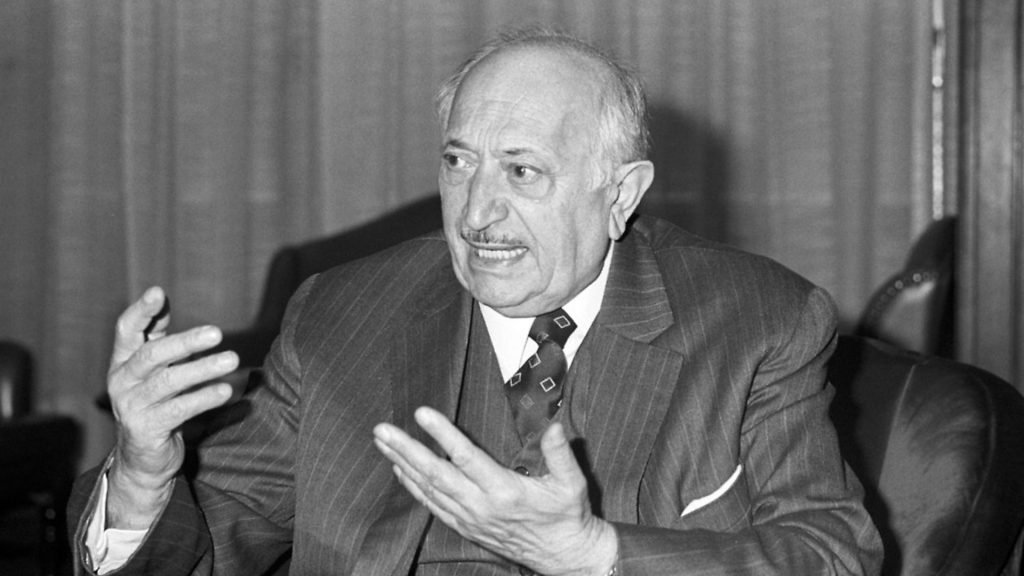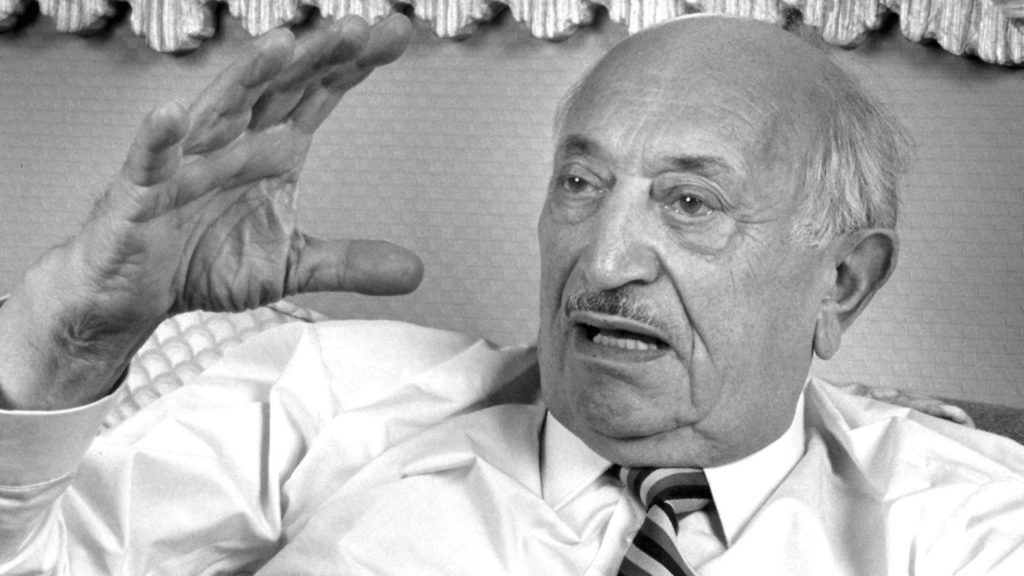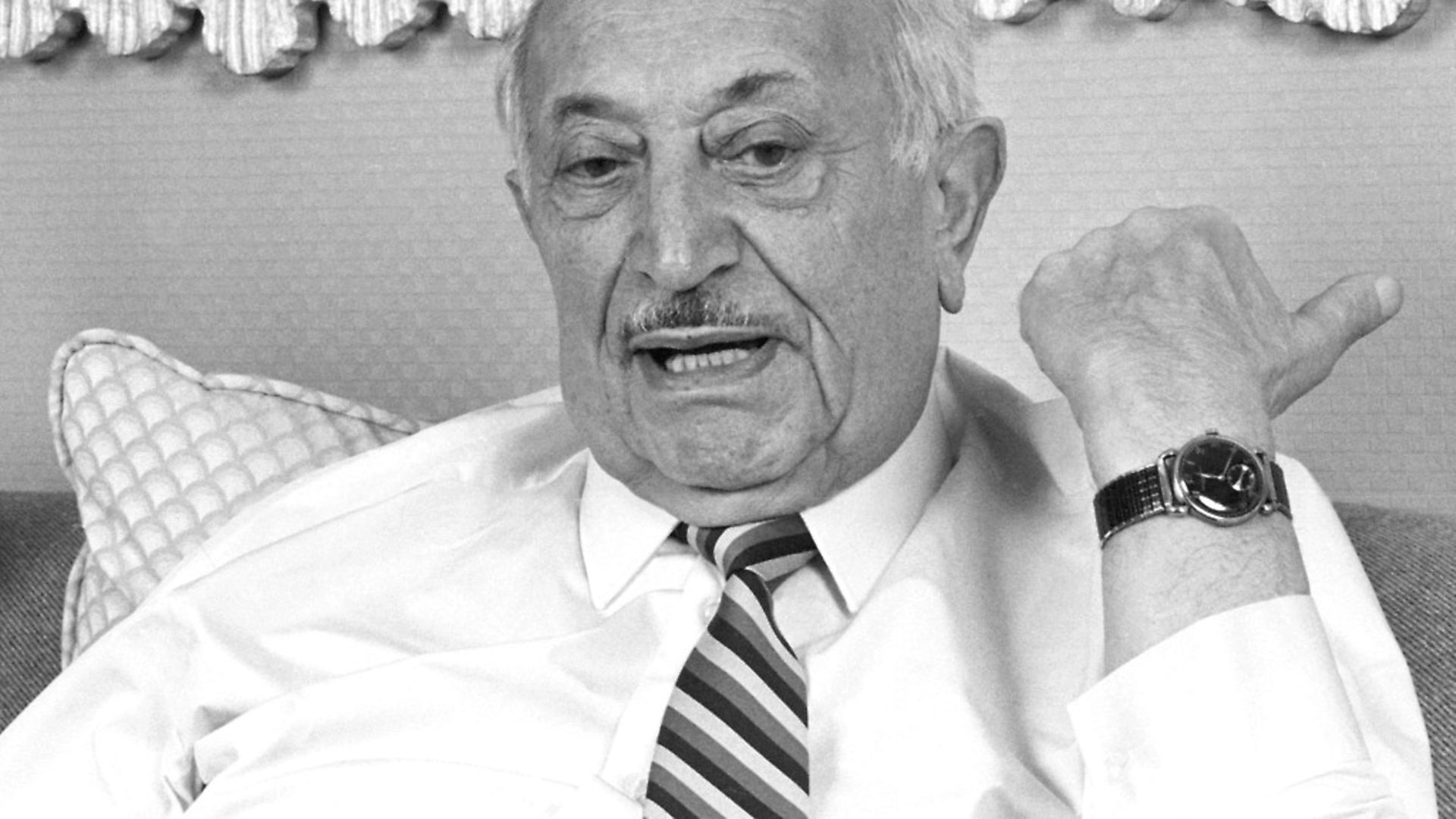Born December 31, 1908; died September 20, 2005. CHARLIE CONNELLY on the extraordinary life of Nazi hunter Simon Wiesenthal

When American troops liberated the Mauthausen concentration camp, east of Linz, on May 5, 1945 they found among the inmates a 36-year-old man lying under a thin blanket on an iron bed in a small building at the edge of the camp. This was the Krankenlager, ostensibly a hospital block but essentially a place where those too old, weak or infirm to work were sent to die.
The man in the bed was an architect named Simon Wiesenthal. He’d spent nearly four years in various concentration camps and come within a whisker of execution countless times. In the spring of 1943, for example, he’d been selected as one of 54 Jewish intellectuals to be murdered in celebration of Hitler’s 54th birthday, only for a last-minute intervention from a works supervisor who valued his draughtsmanship to save his life.
He’d been worked beyond exhaustion and forced to survive on what barely even qualified as starvation rations: when the Americans found him Wiesenthal weighed barely 90 pounds. Almost his entire extended family was dead including, as far as he knew, his wife.
Yet beneath the exhaustion, beneath all the grief and unfathomable trauma, on that day of liberation something was already burning within the emaciated Wiesenthal that would come to define the rest of his life. Barely two days had passed before he asked for a pen and paper and wrote down the names of almost 100 people responsible for or complicit in the deaths of hundreds of thousands of Jews.

Wiesenthal had begun the task of bringing to justice those who had perpetrated the monstrosity of the Holocaust, one that would carry him into his tenth decade and see a range of people brought before the courts, from camp commandants to lowly guards.
Wiesenthal survived the Holocaust. Why he was spared when millions of others perished he couldn’t tell, but his survival sparked an unshakable purpose to which he would cling with remarkable tenacity for the rest of his life: justice.
Full justice for the millions who were killed would never be possible, but perpetrators could at least be found, tried and convicted. For Wiesenthal the visibility of such trials would have an added benefit – keeping the atrocity at the forefront of people’s minds, keeping them informed, reminding the world that the Holocaust wasn’t perpetrated by a uniform or anonymous bureaucracy but by real people, people who had escaped consequences to live normal lives, sometimes even among the very people they’d sought to exterminate.
‘What we experienced during the war was such a nightmare that it is little wonder so many young people tend to look away and say, ‘that’s a part of history and has nothing to do with us today’,’ he said towards the end of his life. ‘But that is where we, the survivors, have to step in and tell them over and over again that all this really did happen; that it is more important for all of you than you can imagine. For you are used to living in freedom, but you should recognise the danger that lies in fast changes that can take away your freedom before you even realise it. I always tell young people you don’t recognise the value of freedom until you’ve lost it. Freedom is not a gift from the heavens, you have to fight for it every day of your life.’
Wiesenthal cut an unlikely figure for a Nazi hunter, spending most of his time among teetering piles of documents at the offices of first the Jewish Document Centre in Linz and from 1961, the Documentation Centre of the Association of Jewish Victims of the Nazi Regime in Vienna. He might have looked more like a librarian than a wielder of the sword of justice against the world’s most notorious evildoers but for all his bookish appearance Wiesenthal was brave, tenacious and effective.
Perhaps his highest-profile scalp was Franz Stangl, commandant of the Sobibor and Treblinka camps, who had overseen the murders of more than 900,000 Jews. Wiesenthal traced him to Brazil where he was captured, tried, convicted and died in prison in 1971.
It wasn’t just the big players, either: one notable success was Hermine Braunsteiner, a notorious guard at the Majdanek and Ravensbrück camps, who would grab children at random by the hair and throw them into carts heading for the gas chambers and who was known as ‘the Stomping Mare’ for her delight in kicking prisoners to death in her steel-capped jackboots. In 1964 Wiesenthal traced Braunsteiner to the Queens district of New York where she was living comfortably as a middle-class housewife married to an American ex-serviceman.
For all his relentless pursuit of Nazis across the world and his numerous successes Wiesenthal wasn’t without his critics. He was prone to exaggeration of his achievements and experiences. He claimed responsibility for some 1,100 former Nazis being brought to trial when others place the actual figure in dozens.
When the high-ranking Adolf Eichmann, one of the leading perpetrators of the Holocaust, was captured in South America by Mossad in 1960 and taken to Israel for trial Wiesenthal was quick to claim the credit, even rushing out a book called I Hunted Eichmann. While he had certainly helped in the early stages of the operation, discovering by chance that Eichmann was in Buenos Aires, photographing Eichmann’s brother at a family funeral to show how his quarry’s appearance might have changed since the war and preventing Eichmann’s wife from having him declared dead, Wiesenthal hadn’t quite played the central role he’d claimed.
Yet such criticism shrinks in the light of what he achieved by remaining tirelessly at the forefront of the search for Nazi war criminals until he died in 2005 at the age of 96. Officially he’d retired in 2003 after the death of his wife Cyla, who had also survived the war – between them the couple calculated they lost 89 family members to the Holocaust – but even then he kept up daily visits to the office.
In his final years the number of former Nazis potentially still alive had dwindled almost to nothing – his last successful conviction was of Julius Viel, a former concentration camp guard imprisoned in 2001 for shooting dead seven prisoners – and, as Wiesenthal noted with a trace of satisfaction shortly before his death, ‘I have outlived them all’.
Thanks to Simon Wiesenthal, Nazi war criminals could never sleep easily in their beds. He enjoyed learning that when old Nazis fell out they would threaten each other with a phone call to his office. He never lost his zeal for justice, never relaxed while he knew that somewhere, whether a bustling south American city or rural German village, there was someone, a kindly-looking white-haired old man perhaps, going about their business like a normal citizen but with a past they had sought to escape.
Wiesenthal rejected the notion of collective responsibility, insisting that individuals be brought to justice and, equally importantly, be seen to be brought to justice. His biggest fear was that people might forget.
That it might happen again.
Warning: Illegal string offset 'link_id' in /mnt/storage/stage/www/wp-includes/bookmark.php on line 357
Notice: Trying to get property 'link_id' of non-object in /mnt/storage/stage/www/wp-includes/bookmark.php on line 37








